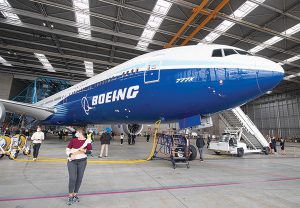Forget the basement window. Boeing Co has somehow managed to fall out of a dungeon.
Some three years after a second Boeing 737 Max crashed and prompted a worldwide grounding of the best-selling jet, not a quarter has passed without some kind of fresh bad news out of the planemaker. The release of first-quarter results was no exception. Boeing burned through $3.6 billion of cash in the first three months of 2022, more than analysts expected, as inventories of undeliverable 787 Dreamliner planes piled up amid regulatory scrutiny of production processes and tiny wrinkles in the carbon fiber frame. The planemaker has submitted a 787 certification plan to the Federal Aviation Administration and is conducting test flights, but it remains unclear when it will actually hand over planes to customers again.
Meanwhile, the company’s efforts to clear out a glut of 737 Max inventory and ramp up production of new jets have been complicated by delays in the restart of deliveries to China. Covid lockdowns have undercut demand for new jets in that country, while investigations are continuing into a crash last month of an older version of the 737 model.
But that’s not all. Boeing also officially delayed the commercial rollout of its jumbo 777X jet until 2025, a reflection of the additional hoops it needs to jump through to get new aircraft certified by cautious regulators in the wake of the 737 Max crisis.
The company will pause production on the passenger version of the new 777X planes through 2023 to avoid building yet more inventory that it has nowhere to ship. This will result in $1.5 billion of abnormal costs beginning in the second quarter and continuing until manufacturing resumes. Boeing also took a combined $1 billion in charges in its defense unit to reflect higher costs and delays in the development of next-generation Air Force One jets and supply chain constraints and inflation in the T-7A Red Hawk trainer program. It’s the latest evidence that the company’s strategy of bidding low for fixed-cost defense programs on the expectation that future service work and its commercial business would provide enough of a cash-flow and profit cushion was ill-advised.
Cowen & Co analyst Cai Von Rumohr called it a “deck-clearing†quarter. Boeing is certainly not alone among industrial companies in reporting noisy results for the start of 2022 as inflation bites, supply chain constraints linger and Russia’s invasion of Ukraine and China’s Covid lockdowns create fresh challenges. But the problem is Boeing has cleared the deck in quite a few quarters in recent years, and it’s still far from certain that this is the last of the muck. Aerospace should be a bright spot in the industrial economy right now: Business and international travel demand are starting to catch up with the robust leisure recovery, fueling greater demand for new jets than manufacturers can supply.
—Bloomberg
 The Gulf Time Newspaper One of the finest business newspapers in the UAE brought to you by our professional writers and editors.
The Gulf Time Newspaper One of the finest business newspapers in the UAE brought to you by our professional writers and editors.
